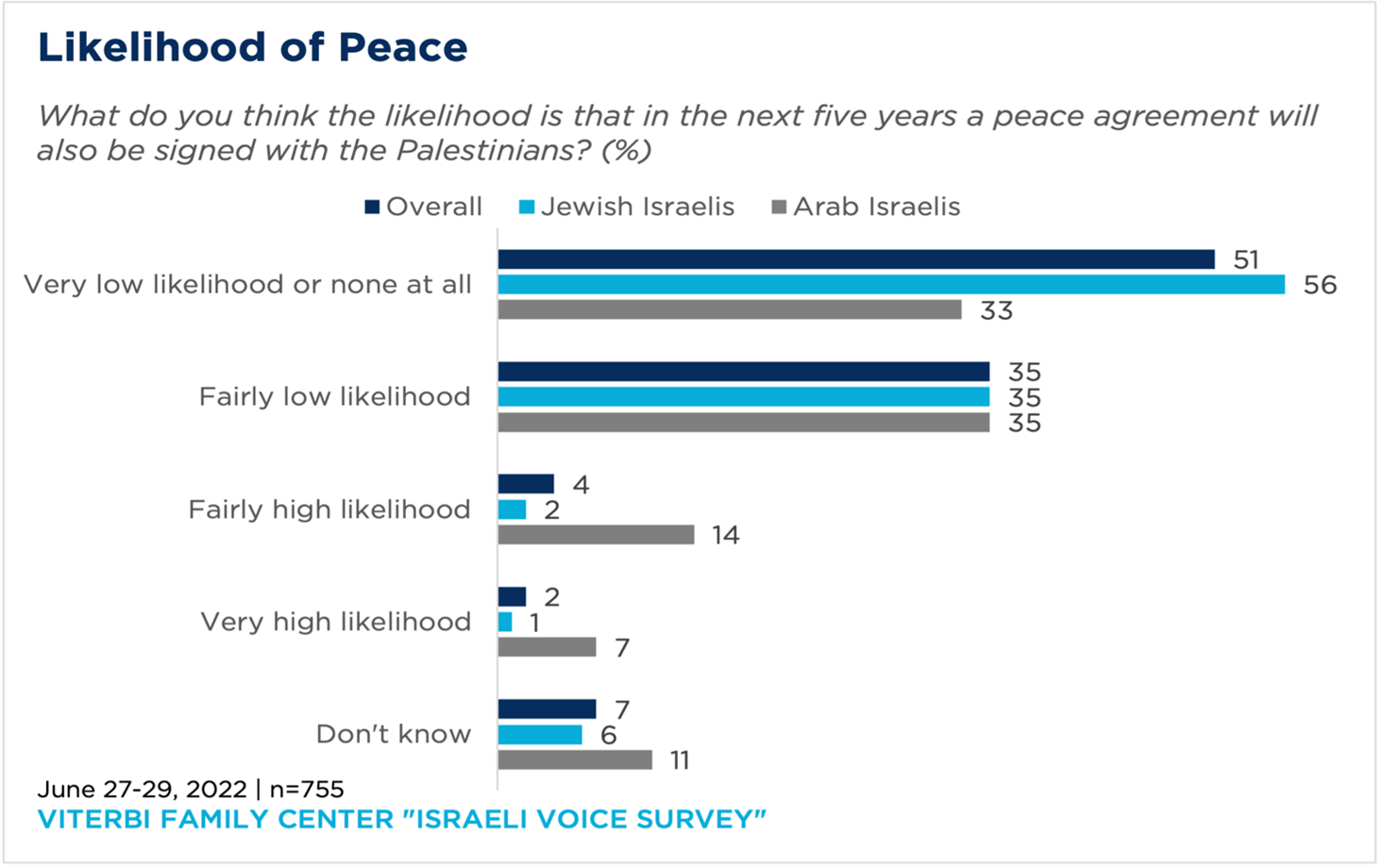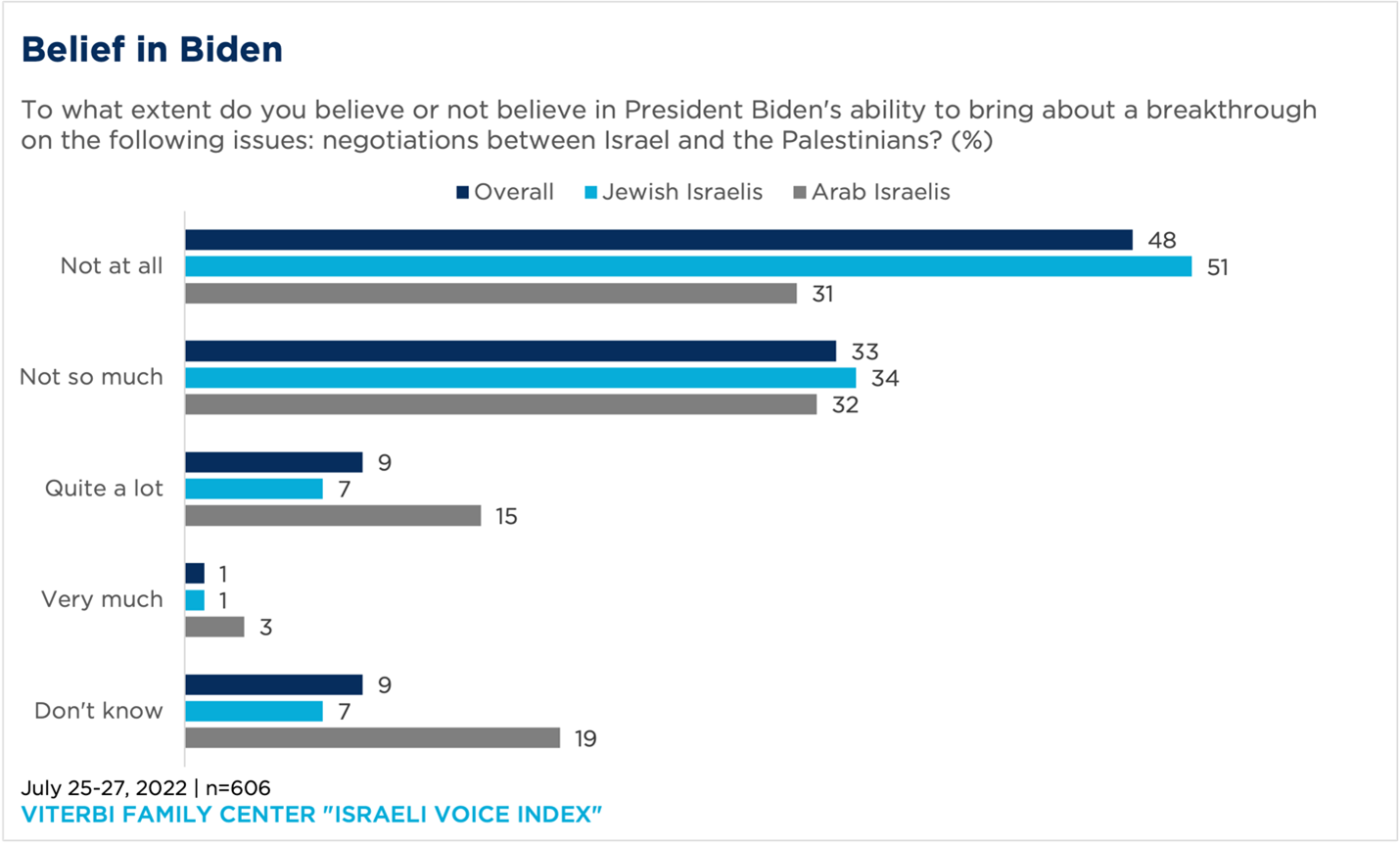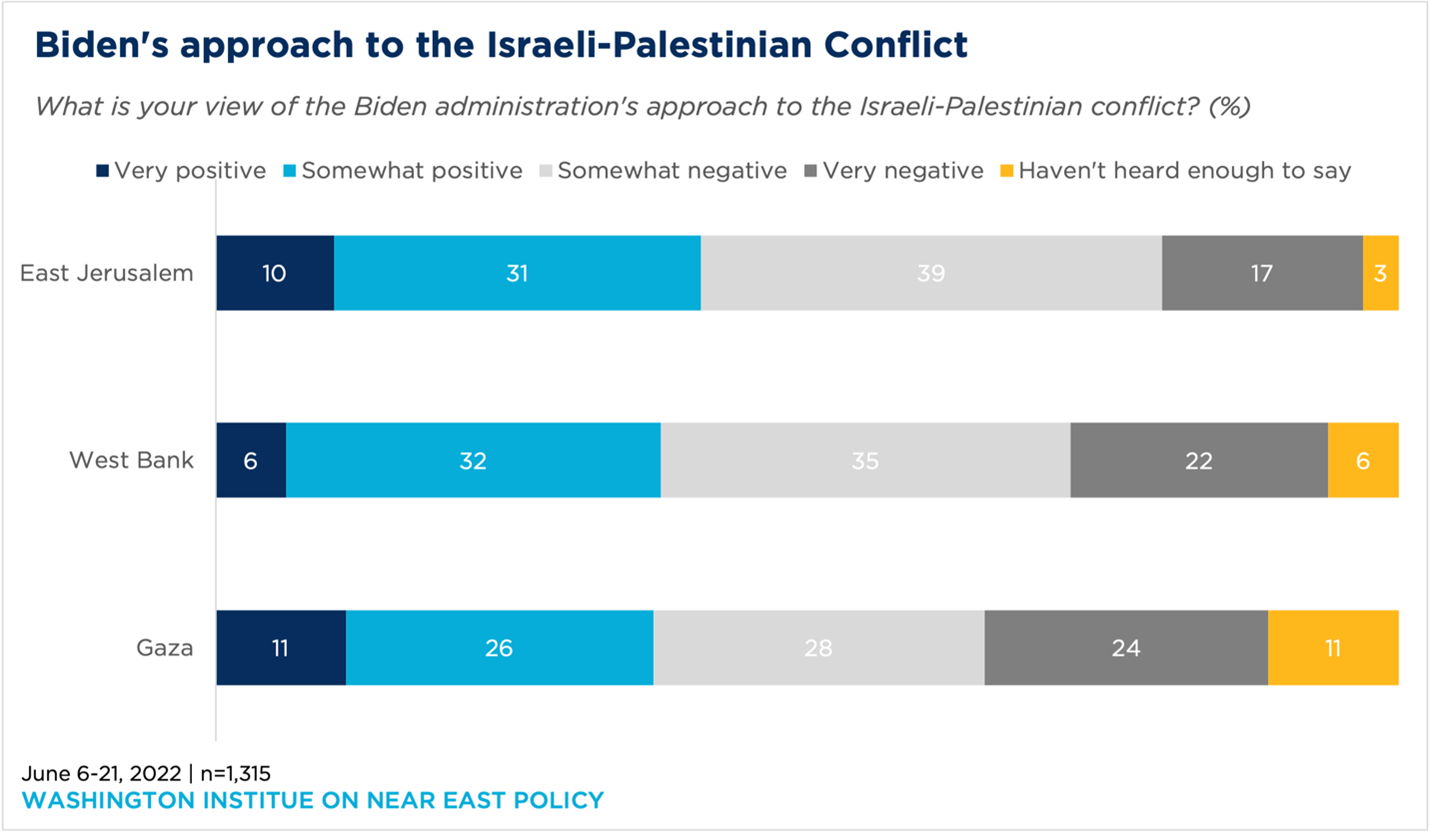Biden, Israelis, and Palestinians: "The Ground is Not Ripe"

As attention returns to Gaza, majorities view a breakthrough in negotiations as unlikely in the foreseeable future.
Earlier this month, the Israeli military and elements of Palestinian Islamic Jihad in the Gaza Strip exchanged missile, rocket, and mortar fire. The multiday conflict resulted in the deaths of at least 44 Palestinians, including 15 children, according to the Gaza Health Ministry. A ceasefire has held since August 7, but the recent violence and other flareups over the past few years underscore how far away an agreement on lasting peace seems to many.
According to several polls taken within the past two months, Israelis and Palestinians remain thoroughly pessimistic about the chance of a breakthrough in negotiations on the Israeli-Palestinian conflict or a resolution to the conflict in the foreseeable future. Majorities are also skeptical of US President Joe Biden’s ability to bring about any sort of progress in the situation, despite his visit in July.
Israelis and Palestinians See Negotiations, Let Alone Peace, as Very Unlikely in Coming Years
With the last signed agreement between Israel and Palestine occurring in 1995 and direct talks stalled since 2014, many Israelis and Palestinians do not expect renewed negotiations, let alone a solution to the ongoing conflict, any time soon. In a June 27–29 poll conducted by the Viterbi Family Center at the Israel Democracy Institute, large majorities of both Jewish (91%) and Arab (68%) citizens of Israel saw the likelihood of signing a peace agreement with the Palestinians in the next five years as low. This lack of optimism is not new; Viterbi Family Center polling has found consistently low confidence in the likelihood of a peace agreement in the near future.

It is worth noting that the “Arab Israelis” surveyed by the Viterbi Center, also known as Palestinian citizens of Israel, differ from Palestinians in the West Bank, Gaza, or Jerusalem, who are not citizens of Israel and do not hold associated rights of citizenship. As such, opinions of Palestinian citizens of Israel are not generalizable to those of Palestinian populations elsewhere. Instead, in this poll, highlighting both Jewish and Arab subgroupings helps demonstrate skepticism across the Israeli population about reaching a resolution soon.
For their part, Palestinians in the West Bank and Gaza also seem skeptical about the prospect of an imminent deal. A June 22–25 poll from the Palestinian Center for Policy and Survey Research finds that seven in 10 Palestinians (69%) oppose an unconditional resumption of Palestinian-Israeli negotiations. Additionally, 77 percent view the chances as “slim to nonexistent” that a separate Palestinian state can be created alongside Israel in the next five years. Generally known as the “two-state solution,” this is the most widely discussed peace proposal and officially supported by the United States. When considered together, these surveys show that neither Israelis nor Palestinians expect a breakthrough anytime in the near future.
Will Biden and the United States Be a Difference Maker? Most Say "No"
Biden made his first presidential visit to Israel and Palestine last month. Despite Biden's decades-long history with Israel and US efforts to mitigate the conflict, neither Israelis or Palestinians appear to have much confidence in his ability to bring about a change in the status quo.
In a July 25–27 Viterbi Center poll, soon after Biden’s visit, most Israelis—Jewish and Arab alike—had little (33%) or no faith (48%) that he could “bring about a breakthrough” with regard to negotiations. Jewish Israelis were most pessimistic about Biden’s potential to facilitate a breakthrough, with 85 percent reporting “no” or “not so much” belief in Biden’s ability. Nearly two-thirds of Arab Israelis shared the same view (63%).

Israeli opinion on Biden appears to be the latest in a longer trend of skepticism regarding the ability of recent American presidents to facilitate progress in the ongoing conflict. In 2019, a majority of Israelis (71%) believed that a peace plan proposed by President Donald Trump would have only low chances of succeeding, and in February 2013, 59 percent had little or no belief that President Barack Obama could bring about a breakthrough. Although these figures are not directly comparable due to differences in circumstances and question wording, it appears that Israelis have displayed a lack of belief in American presidents’ ability to generate change for at least for the past decade. Israelis do, however, seem slightly less optimistic about Biden’s ability to achieve a breakthrough than they were of his predecessors.
For their part, Palestinians today also have their doubts about the Biden administration’s approach to the conflict. When asked to assess the administration’s approach to the Israeli-Palestinian conflict as a whole, slim majorities viewed it negatively (65% East Jerusalem, 57% West Bank, 52% Gaza) according to a June 6–21 Washington Institute on Near East Policy poll.

Palestinian opinion on Biden underscores how many Palestinians may feel about the limited chances for success if they return to the negotiating table, especially if the United States is involved in the process. During Obama’s presidency, majorities of Palestinians (64%) saw the United States as more supportive of Israel than Palestine (7%), but 61 percent in the West Bank and Gaza favored the Obama administration taking a stronger role in the peace process. Now, almost a decade later, 65 percent of Palestinians are opposed to “a return to dialogue” with the Biden administration, an indication of how the negotiating environment has changed in the past decade.
Even before the events in Gaza, 2022 had seen its share of clashes, killings, and political turmoil, enough to reaffirm the belief of most Palestinians and Israelis that peace is a long way off. This belief was echoed by Biden when he said that “the ground is not ripe to restart negotiations” on a lasting peace, leading some experts to conclude that “restarting the peace process is not a US priority.” Even if restarting talks were a Biden priority, it is unclear whether Israelis or Palestinians would welcome the United States’ role, with many skeptical of Biden’s ability to generate progress. As Israelis and Palestinians pick up the pieces after another week of violence, a resolution to the conflict continues to appear as far away as ever.

